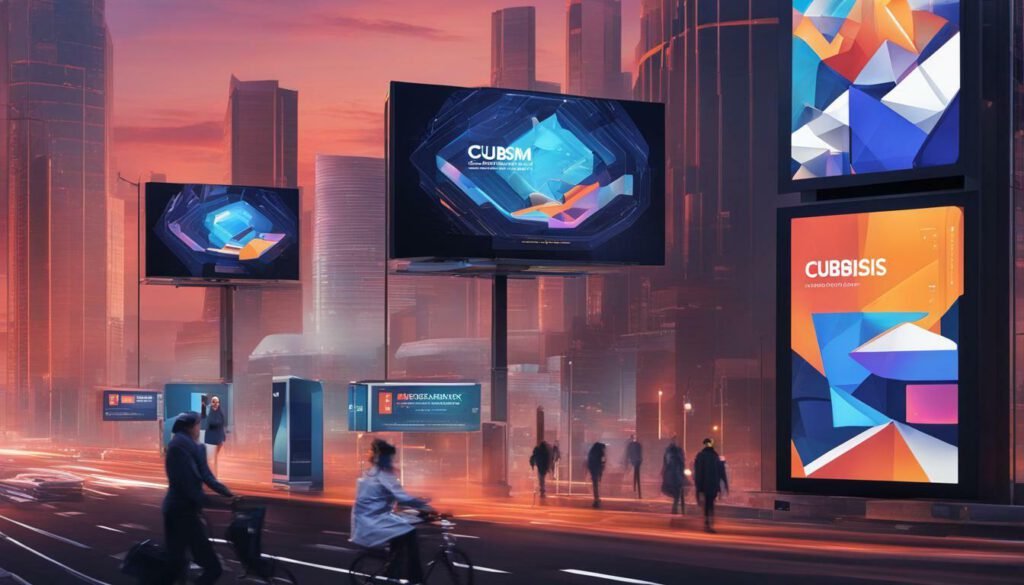Artificial Intelligence (AI) is transforming the digital landscape, and its impact on marketing is no exception. As businesses strive to stay ahead in the ever-evolving world of online promotion, embracing AI technologies has become a crucial strategy for optimizing brand performance. AI’s potential to revolutionize digital marketing is enormous, paving the way for smarter, more efficient promotion strategies and more personalized customer experiences.
From customer targeting to content optimization and campaign management, AI-powered tools and algorithms empower marketers to fine-tune their strategies and achieve better results. With predictive analytics, AI can analyze large datasets, identify trends, and make data-driven predictions, enabling marketers to optimize their campaigns with precision. AI-driven personalization, chatbots, and recommendation engines can enhance customer experiences, while real-time optimization and automation enable marketing processes to be adjusted on the fly for maximum impact.
However, as with any powerful technology, the ethical implications of AI in digital marketing must be considered. Ensuring responsible AI implementation is essential for issues such as data privacy, algorithm bias, and transparency. Nevertheless, AI’s transformative potential in smart digital marketing cannot be ignored, and businesses that embrace it will undoubtedly pave the way for the future of online promotion.
Understanding AI in the Digital Marketing Landscape
Artificial Intelligence (AI) has emerged as a game-changer in the world of digital marketing. It has the potential to transform the way businesses target and engage with customers online, paving the way for smart digital marketing strategies. In this section, we take a closer look at AI technologies and how they are shaping the digital marketing landscape.
AI can be defined as a set of algorithms and tools that enable machines to learn and make decisions based on data. In the context of digital marketing, AI-powered tools can perform a range of tasks, from customer segmentation and targeting to content optimization and campaign management. With AI, marketers can gain deeper insights into customer behavior and preferences, and use this information to create more personalized and effective marketing campaigns.
One of the key areas where AI is making an impact is in customer targeting. AI algorithms can analyze vast amounts of data to identify patterns in customer behavior, interests, and demographics. This information can then be used to create more targeted and relevant marketing messages, leading to higher engagement and conversion rates.
Another area where AI is proving useful is in content optimization. AI can analyze a range of factors, such as search engine rankings, social media engagement, and conversion rates, to identify which types of content are resonating with customers. This information can then be used to create more compelling and effective content, which in turn leads to higher engagement and conversion rates.
AI is also helping marketers to manage their campaigns more effectively. AI-powered tools can monitor campaign performance in real-time, identify areas for improvement, and adjust campaign parameters accordingly. This leads to more efficient and effective campaigns, and minimizes the risk of wasted ad spend.
In summary, AI is a powerful tool that is revolutionizing the way businesses approach digital marketing. By leveraging AI-powered technologies, businesses can gain deeper insights into customer behavior and preferences, and use this information to create more targeted and effective marketing campaigns. As the digital marketing landscape continues to evolve, AI will undoubtedly play an increasingly important role in driving business success.

Leveraging AI for Predictive Analytics in Marketing
Artificial intelligence (AI) has emerged as a powerful tool for digital marketers seeking to optimize their strategies and drive better results. One of the key areas where AI is making a significant impact is in the field of predictive analytics for marketing purposes.
By leveraging AI algorithms, marketers can analyze large datasets, identify trends, and make data-driven predictions about consumer behavior and preferences. This can help them to tailor their marketing campaigns more effectively and deliver better results.
AI-powered predictive analytics tools can provide marketers with insights into customer behavior, such as purchase history, search behavior, and social media activity. By analyzing this data, AI algorithms can identify patterns and trends that would be difficult for humans to discern, and make predictions about future behavior.
| Benefits of AI-powered Predictive Analytics in Marketing | Examples |
|---|---|
| Improved customer targeting and segmentation | Using AI to analyze customer data and create targeted marketing campaigns based on predicted behavior. |
| More effective content optimization | Using AI to analyze content performance across different channels and optimize content for maximum engagement. |
| Better campaign management and optimization | Using AI to monitor campaign performance in real-time and adjust strategies on the go to maximize impact. |
By harnessing the power of AI for predictive analytics in marketing, companies can gain a competitive advantage by delivering more targeted, personalized, and effective marketing campaigns.

With AI-generated insights, marketers can make data-driven decisions that optimize brand performance and drive business success.
Enhancing Customer Experience with AI-driven Personalization
One of the many potential applications of AI in digital marketing is personalized customer experience. AI-powered tools and algorithms can analyze large amounts of data about customer preferences, behaviors, and demographics to create individualized experiences that drive engagement and conversions.
One of the most common examples of AI-driven personalization is chatbots. Chatbots use natural language processing (NLP) and machine learning to understand and respond to customer inquiries, providing personalized recommendations and support. Many brands have also adopted recommendation engines that use AI algorithms to suggest relevant products or services based on customer data.
Dynamic content generation is another AI-powered strategy for delivering personalized customer experiences. By analyzing customer data, AI can generate content that is specific to each individual’s interests and behaviors, increasing engagement and brand loyalty. Personalized emails, for example, have been shown to have higher open rates and click-through rates than generic emails.
In addition to delivering personalized experiences, AI can also enhance the efficiency of customer service processes. Chatbots and virtual assistants, for instance, can handle routine inquiries and support requests, freeing up human representatives to focus on more complex issues. This can boost customer satisfaction by reducing wait times and improving response times.

AI-driven personalization can revolutionize the customer experience, delivering tailored content, recommendations, and support.
AI’s Role in Real-time Marketing Optimization
Real-time marketing optimization can be a game-changer for digital marketers. By leveraging the power of AI, marketers can analyze customer behavior, campaign performance, and market trends to adjust marketing strategies on the go and maximize impact.
AI algorithms can process vast amounts of data in real-time, providing instant insights to inform marketing decisions. For example, AI-powered tools can monitor website traffic and user behavior to identify opportunities for personalized engagement, such as dynamic content generation and personalized recommendations based on customer preferences.

The use of AI in real-time marketing optimization also enables marketers to identify trends and predict outcomes. By analyzing data from past campaigns and market trends, AI algorithms can provide recommendations for future initiatives, optimizing ROI and campaign performance.
However, it is important to note that the use of AI in marketing also raises ethical concerns. It is crucial to ensure that AI algorithms are transparent, unbiased, and respectful of user privacy. Implementing responsible AI practices can mitigate ethical risks and promote trust and loyalty among customers.
The Benefits of AI in Real-time Marketing Optimization
Some of the key benefits that marketers can gain from leveraging AI in real-time marketing optimization include:
- Improved targeting and personalization
- Enhanced customer engagement and satisfaction
- Better campaign performance and ROI
- Greater efficiency and cost-effectiveness in marketing efforts
Overall, AI is transforming the way marketers approach real-time marketing optimization, enabling data-driven decision-making and personalized engagement at scale. By embracing AI technologies, marketers can stay ahead in the evolving digital landscape and maximize the potential of their brands.
AI and the Future of SEO
The world of search engine optimization (SEO) constantly evolves, and the advancement of AI technology is taking it to the next level. As search engines become smarter, businesses need to adapt their SEO strategies accordingly to stay ahead of the competition.
One of the main ways in which AI is revolutionizing SEO is through the use of natural language processing (NLP) algorithms. NLP enables search engines to better understand the context and intent behind search queries, making it easier to deliver relevant and personalized search results to users.
Another area where AI is making a significant impact on SEO is in the realm of content optimization. AI-powered tools can analyze website content to identify relevant keywords, suggest improvements to website structure, and generate content ideas based on user intent and historical search data. This helps businesses create more effective content that resonates with their target audience and boosts their search engine rankings.
AI is also changing the way businesses approach keyword research. Rather than relying on manual processes to identify popular keywords and phrases, AI can analyze vast amounts of data to identify emerging search trends and predict which keywords are likely to generate the most traffic. This helps businesses stay ahead of the curve and capitalize on new opportunities before their competitors.
As AI continues to evolve, the future of SEO will likely see even more advancements in areas such as voice search optimization and predictive search. Businesses that embrace these technologies and adapt their SEO strategies accordingly will be well-positioned to succeed in the ever-changing digital landscape.

Harnessing AI for Effective Social Media Marketing
Social media has become an integral part of any digital marketing strategy. With the rise of AI, social media marketing has become even more effective. AI-powered social listening tools enable businesses to monitor, analyze, and respond to customer conversations in real-time. This helps in identifying customer pain points and creating content that caters to their specific needs.
The use of AI in sentiment analysis can help brands to track customer sentiment and identify negative feedback before it gains momentum. Chatbots powered by AI can also be used to improve customer engagement by providing quick responses to queries and concerns.
Personalized social media experiences can be created through the use of AI-powered recommendation engines. These engines can analyze customer data and provide content recommendations that are tailored to individual preferences. This helps in creating a better customer experience and improving engagement rates.

Real-time engagement is critical in social media marketing, and AI can help businesses to achieve this. By analyzing customer behavior and campaign performance, AI algorithms can provide insights that enable marketers to adjust their strategies on the go.
Overall, the use of AI in social media marketing can significantly enhance customer engagement and drive better results. As AI technologies continue to evolve, businesses that leverage AI in their social media marketing efforts will have a distinct advantage over their competitors.
AI-driven Automation in Digital Advertising
Artificial intelligence (AI) has rapidly transformed the digital advertising landscape, with the use of automation being one of the most significant developments. Automation has enabled advertisers to streamline their processes, from ad placement to targeting and budget optimization.
One of the key benefits of AI-driven automation is the ability to target individual customers with personalized ads. By analyzing user behavior, interests, and preferences, AI algorithms can deliver tailored ads that are more likely to convert. This allows for a more efficient and cost-effective advertising strategy, with higher ROI and better engagement rates.
The use of AI-powered bidding systems has also revolutionized the way ad inventory is bought and sold. Automated bidding allows for real-time optimization of ad spend, enabling advertisers to allocate their budget more effectively and maximize the impact of their campaigns. This technology has also reduced the need for manual optimization, saving advertisers time and resources.
Maximizing Automation with AI
While automation has already transformed the digital advertising landscape, the technology is still evolving. AI is enabling advertisers to take automation to the next level, with more advanced tools and algorithms that can analyze data at scale and make predictions for optimized performance.
For example, some AI-driven automation tools are able to predict which ad creative will perform best for a particular audience, based on previous engagement and conversion rates. This allows for a more data-driven approach to ad creation and optimization, with automated testing and iteration for continuous improvement.
Overall, AI-driven automation is allowing advertisers to streamline their processes and enhance the efficiency and effectiveness of their digital advertising campaigns. By leveraging the power of AI, advertisers can create more personalized and impactful ads, optimize their budgets and targeting, and ultimately drive better results for their brands.

The Ethical Implications of AI in Digital Marketing
The use of AI in digital marketing has brought about numerous benefits, including better targeting, increased engagement, and improved ROI. However, the adoption of these technologies is not without challenges and ethical considerations. As AI continues to transform the digital landscape, it is crucial to maintain responsible and ethical practices that safeguard privacy, prevent bias, and promote transparency.
Data Privacy and Security
One of the primary concerns surrounding the use of AI in digital marketing is the issue of data privacy and security. With the vast amounts of data generated daily, it is critical to ensure that customer data is collected, stored, and used in compliance with privacy regulations. This requires implementing robust security measures, obtaining explicit consent from customers, and providing clear information about data collection and usage practices.
Algorithm Bias
Another ethical consideration is the potential for algorithm bias in AI-powered marketing. The algorithms used in customer segmentation and targeting may inadvertently discriminate against certain groups based on factors such as race, gender, or age. To prevent such bias, it is essential to ensure that algorithms are designed and trained with diverse datasets that accurately represent the target audience.
Transparency and Accountability
Transparency and accountability are also critical ethical considerations when it comes to AI in digital marketing. Customers should have clear information about how their data is being used, and marketers should be accountable for the ethical implications of their marketing practices. This includes providing explanations of how algorithms work and how they are used in decision-making processes, as well as being transparent about how user data is being collected, analyzed, and shared.
Conclusion
As AI continues to reshape the digital marketing landscape, it is crucial to adopt responsible and ethical practices that prioritize customer privacy, prevent bias, and promote transparency. By doing so, marketers can harness the transformative potential of AI while building trust with their target audience.

Conclusion
AI is rapidly changing the landscape of digital marketing, and its transformative potential cannot be ignored. By leveraging AI-powered tools and algorithms, brands can enhance their online promotion strategies, optimize customer targeting, and drive better results. The use of AI in predictive analytics, customer experience personalization, real-time marketing optimization, and automation is already reshaping the industry, paving the way for smart digital marketing.
As AI continues to advance, it is important for marketers to stay informed and prepared for the evolving digital landscape. However, it is equally important to consider the ethical implications of AI in marketing practices, such as data privacy, algorithm bias, and transparency. Responsible AI implementation is crucial to ensuring that AI technologies benefit both businesses and customers.
By embracing AI, digital marketers can gain a competitive edge and drive success in today’s fast-paced and data-driven world. The journey to smart digital marketing starts with understanding AI and its applications, and taking advantage of its capabilities to optimize brand performance. Embracing AI ultimately means smarter marketing, and the potential for transformative results.




